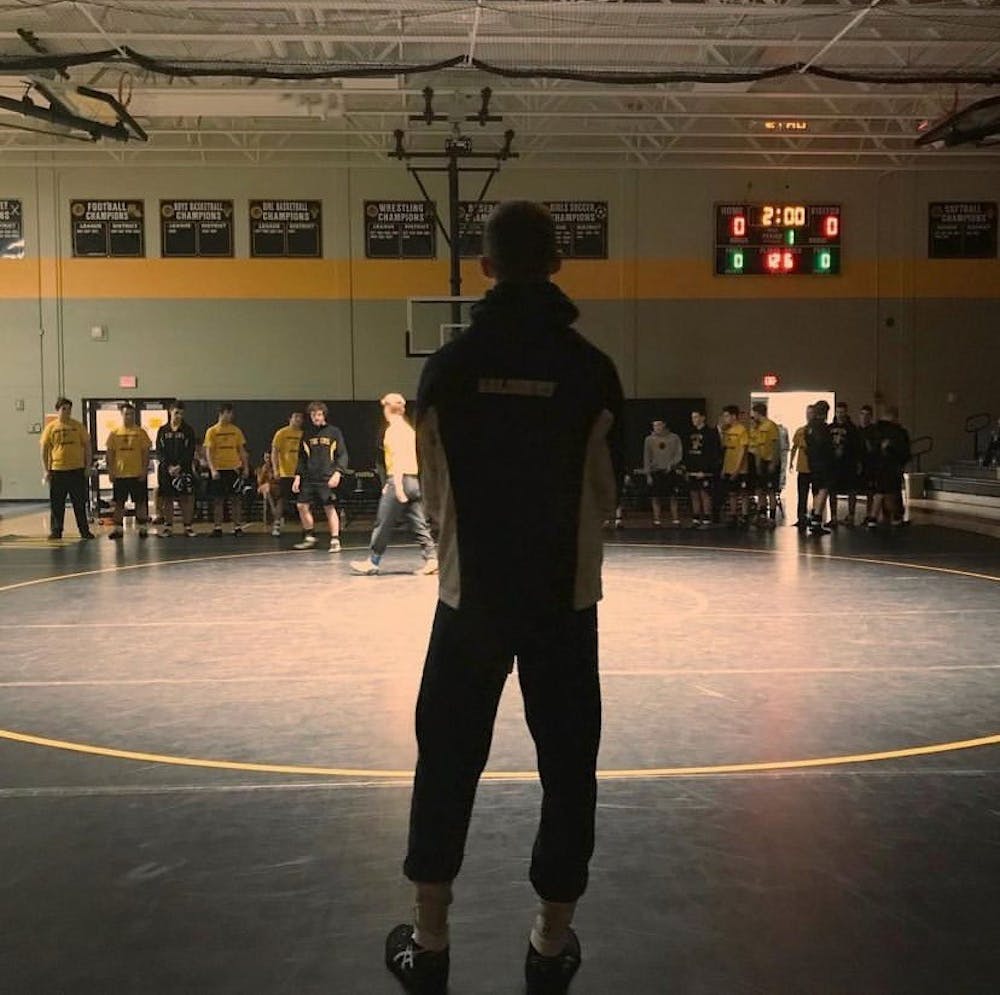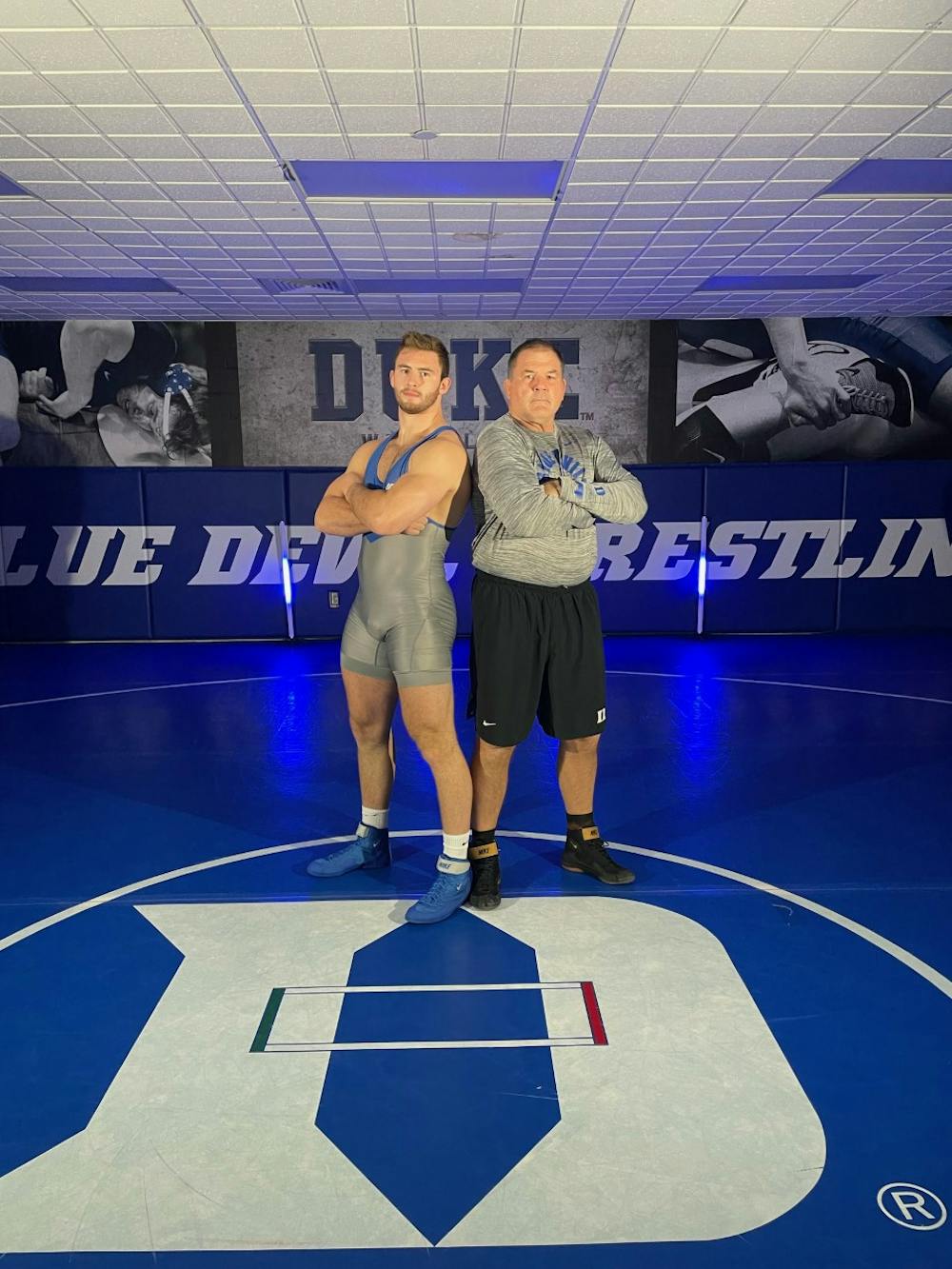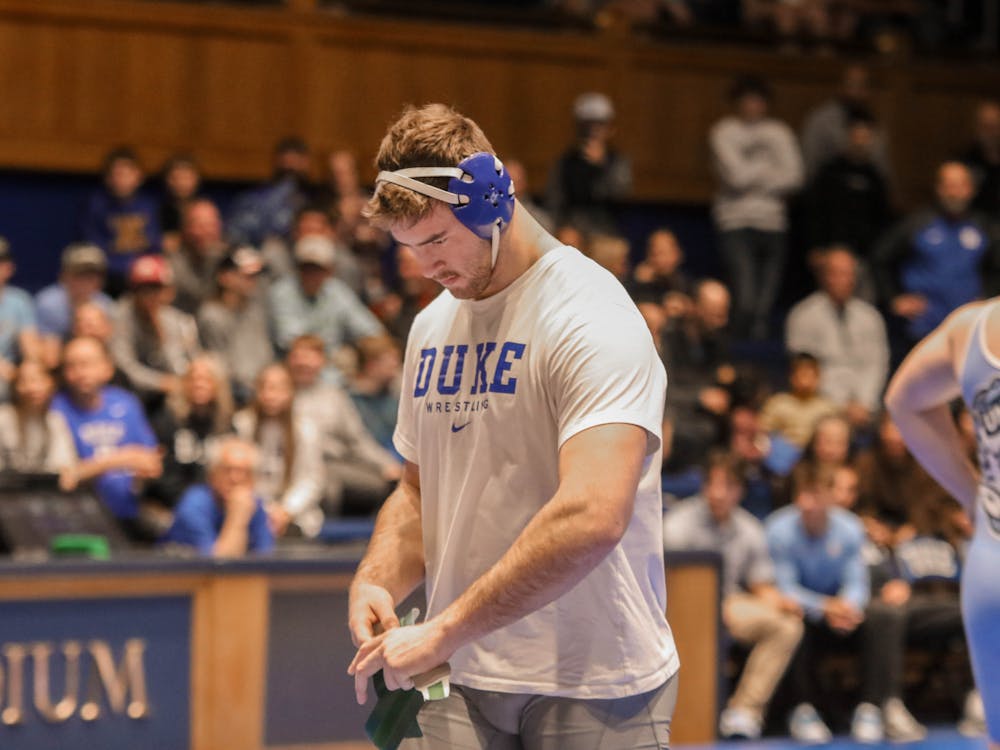It’s 3 a.m. in Allentown, Pa., and 16-year-old Jonah Niesenbaum has just fallen asleep when his phone rings. It’s a call from his high school wrestling coach, Juan Garcia.
“I’m outside your house,” Niesenbaum recalls Garcia saying, “put on some running shoes and bring a towel.”
Instead of turning over and going back to bed, the future Blue Devil lumbered out and began his morning workout. Garcia and Niesenbaum would run at a park, stopping to lift dead logs found along the trail as extra strength training. The pair would finish their time by running through an icy river, as Garcia encouraged Niesenbaum with stories of athletic warriors like ultramarathon runner David Goggins.
Now, Niesenbaum has a chance to etch his own status as a warrior in Duke’s history. After a 24-win regular season with only three losses, the senior travels to Sunday’s ACC Championships in Raleigh as the top-seeded heavyweight grappler in the conference, with only one goal in mind:
“ACC champion,” he told The Chronicle confidently.
On the mat, Niesenbaum prides himself on the simplicity of his wrestling style. Instead of overthinking and overcomplicating his approach, he moves more reactionarily and fluidly, wrestling as if he was born into a singlet. Sitting outside of Cameron Indoor Stadium with a black T-shirt and blue Fuqua School of Business hat on his head, Niesenbaum reveals himself as a hardworking, thoughtful young man, one who through sheer determination, has found himself in this fantastic position.
Building from ground zero
“I played ice hockey until my last year of high school,” reflected Niesenbaum on the origins of his wrestling career. “And ice hockey was a club sport, and my high school didn't have a team. I remember I really wanted to play something for the school.”
So Niesenbaum, considering following in the footsteps of some of his cousins who went on to wrestle collegiately, gathered up his friends and convinced them to join wrestling with him. However, when the time came to go to Salisbury High School’s athletic office and attend the first practice, Niesenbaum was the only one who showed. Instead of turning away, he was immediately drawn in by the charismatic presence of Garcia.
“Coach Garcia, my high school coach, was a short guy but just totally jacked, jawline out even,” Niesenbaum said. “And I just thought, ‘I want to be like that guy.’”
Although born into the heart of wrestling country in Pennsylvania, Niesenbaum’s high school did not have a large team. In fact, for two years, Niesenbaum was the only grappler on the team, wrestling dual meets completely alone. Starting his days at 3 a.m. or 4 a.m., Niesenbaum would do his park workout before lifting again at 6 a.m. prior to class. After school, he would then attend wrestling practice before completing his homework. The intense schedule led to quick improvement, so much so that Niesenbaum shocked his family when he decided to drop hockey instead of wrestling.
“My dad was like, ‘You got to pick a sport,’ and I was the captain of the hockey team at that point,” Niesenbaum recalled. “But I’ve never had this much attention … [and] improvement so fast. So that’s how I ended up as a wrestler.”
“I learned all the soft skills from my high school coach,” he added. “I learned how to work hard and I learned that all year long, we never stop training.”

Transition to Duke: Starting over again
Niesenbaum’s work ethic carried him to head coach Glen Lanham and Duke, where he joined the team and immediately started. The first two seasons were a struggle, as he went 4-25 in all competitions. Looking to make real improvements, Niesenbaum decided to return to Durham for the summers leading into his junior and senior years. As a non-scholarship sport at Duke, the wrestling team often struggles to retain team members for summer training, during which vital strides can be made. Sacrificing any semblance of a break, Niesenbaum loaded up his schedule and fell under the guidance of assistant coach Tom Erikson.
“I would attribute a lot of [my improvement] to Erikson,” said Niesenbaum. “When Erikson came in my sophomore year, that really changed the game for me. Different people have different styles. And I’ve just decided I’m going to do what Erikson does.”
This past summer, Niesenbaum’s programming somewhat mirrored that of his high school days. He started his day with a 5 a.m. wake up, lift and wrestling practice, all before speeding to Raleigh to make his 9 a.m.-5 p.m. real estate internship. After clocking out, he would come back, work on recovery, occasionally do a second lift, and then do it all again the next day. All the while, Niesenbaum got to work one-on-one with Erikson, completely retooling himself as a grappler.
The biggest adjustment? Tearing down his stance and starting over.
Get The Chronicle straight to your inbox
Sign up for our weekly newsletter. Cancel at any time.
“We’re just trying to simplify what we’re doing [with Niesenbaum],” said Erikson. “It all starts with a stance, staying down and in a good athletic position. I think he has reaped the benefits of that.”
“We’ve been really working on keeping a good stance, which is really simple but it has just been huge. You’ll see my hands touching the mat which I never used to do,” Niesenbaum said, bending over to demonstrate. “Even though I used to think I was getting low, I was so high up, and then they're on your legs. Now it's really hard for anyone to get to my legs.”
“Summer was tearing him down to his basics and building him back up from there,” said Lanham. “He responded really well to that.”
Niesenbaum and Erikson also pride themselves on their communication. Summer practices were spent discussing wrestling theory, and toying around with different offenses and defenses. In the process, they developed their own coded language, which they use to communicate in a match.
“We have our own language. We’ve formed a relationship where he says something, I know exactly what he means,” Niesenbaum said. “We’ll have words that are one position. There’s one … we call Spider-Man. And that’s just because we were messing around in the wrestling room and he said ‘you gotta be on one knee like Spider-Man.’”
“He’s diligent about it. He’ll ask the right questions and he’ll be present,” said Erikson. “A lot of Jonah’s success is because Jonah chooses to have that success.”

Senior-season success
Niesenbaum carried his work ethic into this season, continuing to lift three days a week and studying film during his free time. Although national expectations remained tempered, the coaching staff was high on Niesenbaum coming into the season, naming him their returning grappler to watch and team captain.
Niesenbaum proved them right in the first few weeks, winning the Battle at the Citadel and the Keystone Classic in back-to-back weekends. The latter put the senior on the map, as the path to victory in Philadelphia included wins over No. 22 Ben Goldin of Penn and an overtime victory over No. 15 Hunter Catka to seal the championship.
“Keystone was like the first big thing I ever won,” said Niesenbaum. “It was also the first time I’d beat a ranked opponent, and I beat two of them. I remember being just so excited after that.”
Niesenbaum continued to pull out impressive wins, going undefeated in ACC competition. Another memorable victory included an overtime victory against Brandon Whitman of North Carolina. In front of a sizable crowd full of K-Ville tenters, Niesenbaum was able to reverse a takedown attempt for the win, sending the fans into a frenzy.
“That’s one thing you want from your leader is to not only walk it, but talk it and then be successful,” said Lanham.
Ahead of Sunday’s ACC Championships, Niensenbaum looks to extend the 14-year streak of Duke sending a grappler to NCAAs. Favored to earn a trip to Tulsa, Oklahoma, Niesenbuam continues to work his absolute hardest, taking nothing for granted.
“I blew my lungs out pretty good yesterday. Today was another really good one. I just feel really good about [ACCs],” he said.
After noting that he has already beaten every wrestler he will face this weekend except for N. C. State heavyweight Owen Trephan (they did not wrestle), Niesenbaum reflected on whether he felt any pressure entering the event.
“I [do] feel the pressure,” Niesenbaum said. “It doesn’t matter who I’m wrestling, I get anxious. But it’s exciting, so I thrive off [it].”
No matter how these next few weeks turn out for Niesenbaum, he says he will be returning to Duke next season for his fifth year of eligibility. Already securing a house in the area for the summer, he will train and take classes at Fuqua, working toward the biggest prize in all of college wrestling: All-American status.
“If you look at the All-Americans during Coach Lanham’s 10 years here,” said Erikson, “you’re gonna find those kids stay over the summer, they put in the extra time during the season, they put in individual work, watch film, grab a coach and do all these things. Jonah is the next one.”

